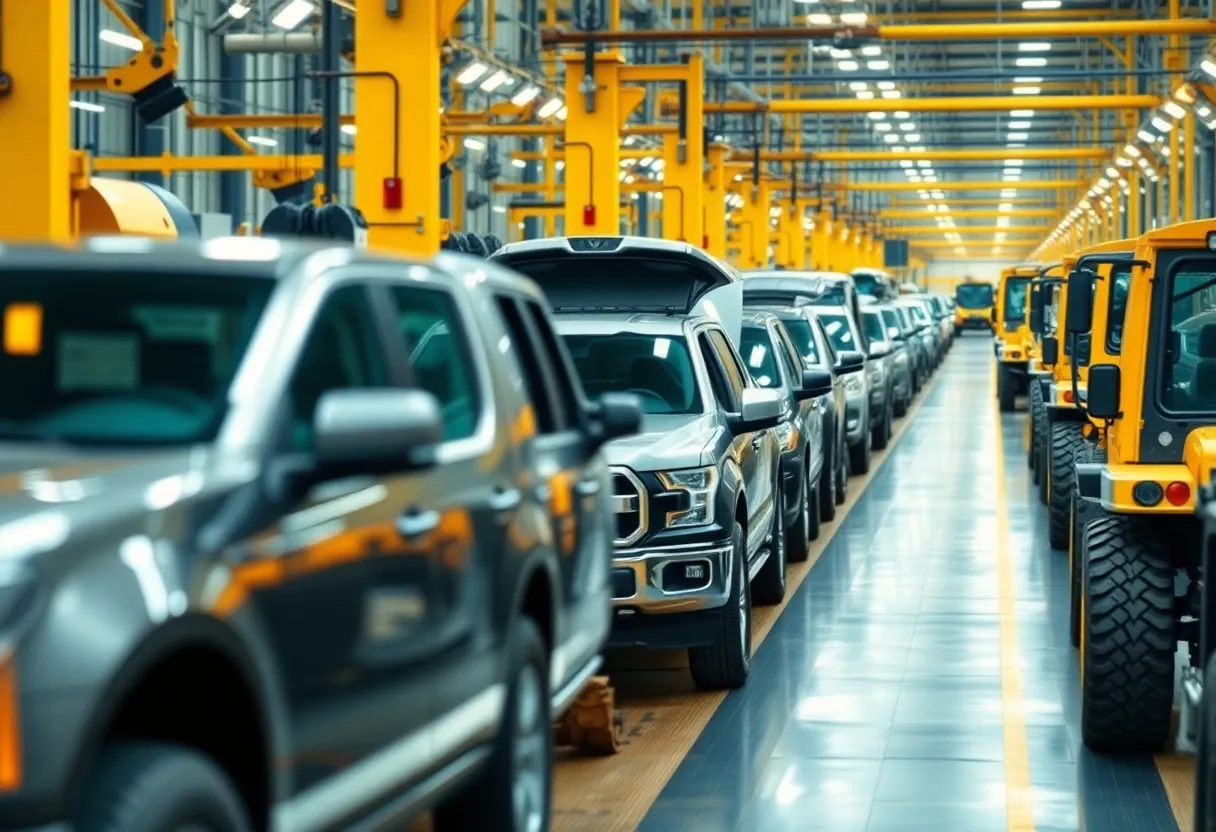News Summary
The automotive industry is grappling with significant uncertainty due to looming trade tariff policies, which may take months to clarify. S&P Global Mobility indicates that previous tariffs have already delayed planning by 12 to 18 months. Ongoing negotiations between the U.S. and international partners suggest tariffs may remain, leading manufacturers to consider increasing domestic production. However, challenges persist, impacting job creation and investments. Companies like Honda have scaled back investments in electric vehicle development, illustrating how trade complications are reshaping corporate strategies and voter sentiment in critical states like Michigan.
Detroit – The global automotive industry is facing significant uncertainty as trade tariff policies loom, with critical forecasts indicating that clarity might take months, potentially extending to the end of the year. According to S&P Global Mobility, this unsettled environment follows a tumultuous period marked by the previous administration’s tariffs, which are estimated to have caused a delay of 12 to 18 months in planning for automakers.
Ongoing negotiations between the U.S. and major international trading partners are critical. These discussions suggest that while some stability on trade policies may eventually arise, many tariffs are likely to remain in place, perpetuating the current state of uncertainty. Compounding the issue, recent announcements have indicated a steep increase in tariffs, including a rise from 25% to 50% on steel and aluminum imports, stirring further concerns within the automotive sector.
In response to the heightened tariffs, automotive manufacturers are increasingly contemplating boosting domestic vehicle production to alleviate the financial burden imposed by high import duties. However, transitioning to greater domestic production is fraught with challenges, necessitating substantial upfront investments in various manufacturing processes including body shops, paint facilities, final assembly, and logistics operations.
The existing climate of tariff uncertainty has resulted in delayed investments across the automotive landscape, adversely affecting initiatives that could have generated thousands of jobs and increased production capacities in North America. In a notable move, Honda Motor Co. recently announced a reduction of $21 billion in its planned investments in electric vehicle development, directly attributing this reconsideration to the persistent complications of trade policies.
As original equipment manufacturers (OEMs) reassess their financial strategies, their reluctance to invest stems from the unpredictability surrounding future trade and regulatory conditions. This has compelled many automakers to concentrate on selling vehicles in the same countries where they are manufactured, avoiding the prohibitive import tariffs. Meanwhile, nations like China and various European countries have reinforced protective measures around their automotive markets, a trend that appears to be mirrored in the U.S.
The shifting dynamics within the auto industry are not only impacting corporate strategies but also influencing political landscapes. Evidence suggests that traditional Democratic support among Michigan autoworkers is pivoting toward Republican candidates, particularly Donald Trump, as workers express concerns about layoffs and electric vehicle mandates in the wake of recent job cuts. Ford Motor Co. has seen layoffs in its electric vehicle production at the Dearborn plant, affecting those involved in the production of the battery-powered F-150 Lightning. This adjustment aligns with Ford’s strategic shift towards hybrid vehicles due to financial losses in its electric vehicle division.
The ramifications of these developments could extend to the upcoming presidential election, which is anticipated to be fiercely contested in key states like Michigan. The ongoing turmoil within the automotive sector is likely to influence voter sentiment as candidates navigate the complexities brought on by tariff and trade discussions, making the current climate more pivotal than ever.
In summary, the automotive industry stands at a crossroads marked by substantial tariff-related uncertainties that could reshape production strategies, investment opportunities, and political affiliations. As manufacturers grapple with these challenges, the overarching impact on employment, corporate stability, and the broader economy remains to be seen.
Deeper Dive: News & Info About This Topic
HERE Resources
BYD Launches Dolphin Surf EV in Europe
Ford Increases Prices on Popular Models Amid Tariffs
Trump Celebrates 100 Days of Second Term at Michigan Rally
The Auto Industry’s Call for Trade Relief
Trump’s First 100 Days: Economic Challenges and Policy Debates
Detroit’s Auto Industry Reacts to New Tariff Changes on Trump’s 100th Day
Detroit Sees Shift in Auto Tariffs for Manufacturing
Trump Signs Executive Order to Reduce Auto Tariffs
Auto Tariffs Eased: A Positive Shift for Car Enthusiasts
US Stock Market Surges Thanks to Tariff Exemptions on Electronics!
Additional Resources
- HARMAN Automotive Unveils New Software Products
- Wikipedia: Automotive Industry
- Carvana Q1 Earnings Preview
- Google Search: Automotive Trade Tariffs
- Manufacturers Check Out Collaborative Robots
- Google Scholar: Automotive Tariff Impacts
- Trump Addressing Michigan Rally on Auto Workers
- Encyclopedia Britannica: Tariffs
Author: STAFF HERE NOVI WRITER
The NOVI STAFF WRITER represents the experienced team at HERENovi.com, your go-to source for actionable local news and information in Novi, Oakland County, and beyond. Specializing in "news you can use," we cover essential topics like product reviews for personal and business needs, local business directories, politics, real estate trends, neighborhood insights, and state news affecting the area—with deep expertise drawn from years of dedicated reporting and strong community input, including local press releases and business updates. We deliver top reporting on high-value events such as Motor City Comic Con, Michigan State Fair, and Novi Home and Garden Show. Our coverage extends to key organizations like the Novi Chamber of Commerce and Novi Community Foundation, plus leading businesses in automotive, technology, and manufacturing that power the local economy such as Gentherm, Stoneridge, and Daifuku North America. As part of the broader HERE network, including HEREDetroitMI.com, HEREGrandRapids.com, HERENorthville.com, and HEREPlymouth.com, we provide comprehensive, credible insights into Michigan's dynamic landscape.






